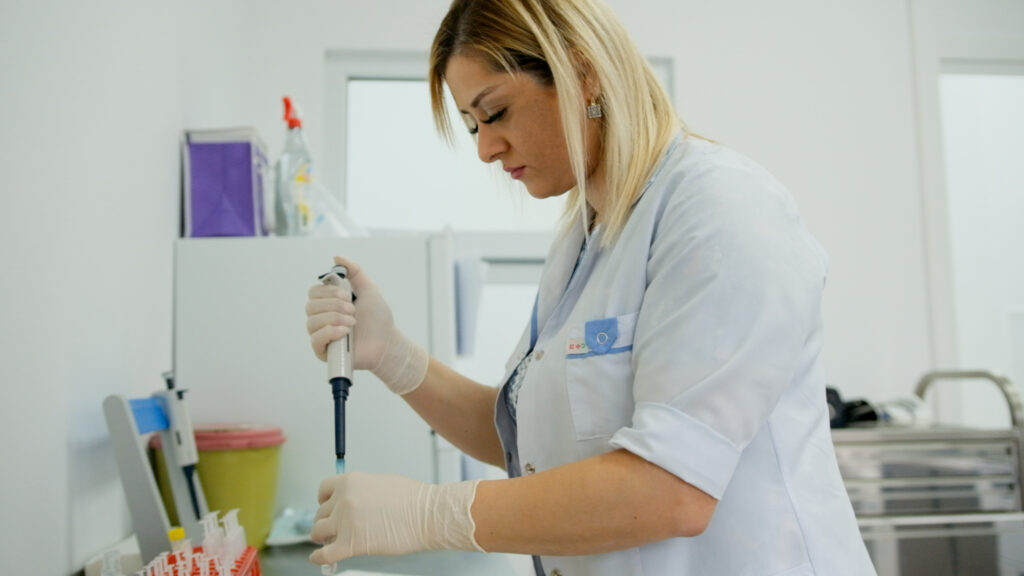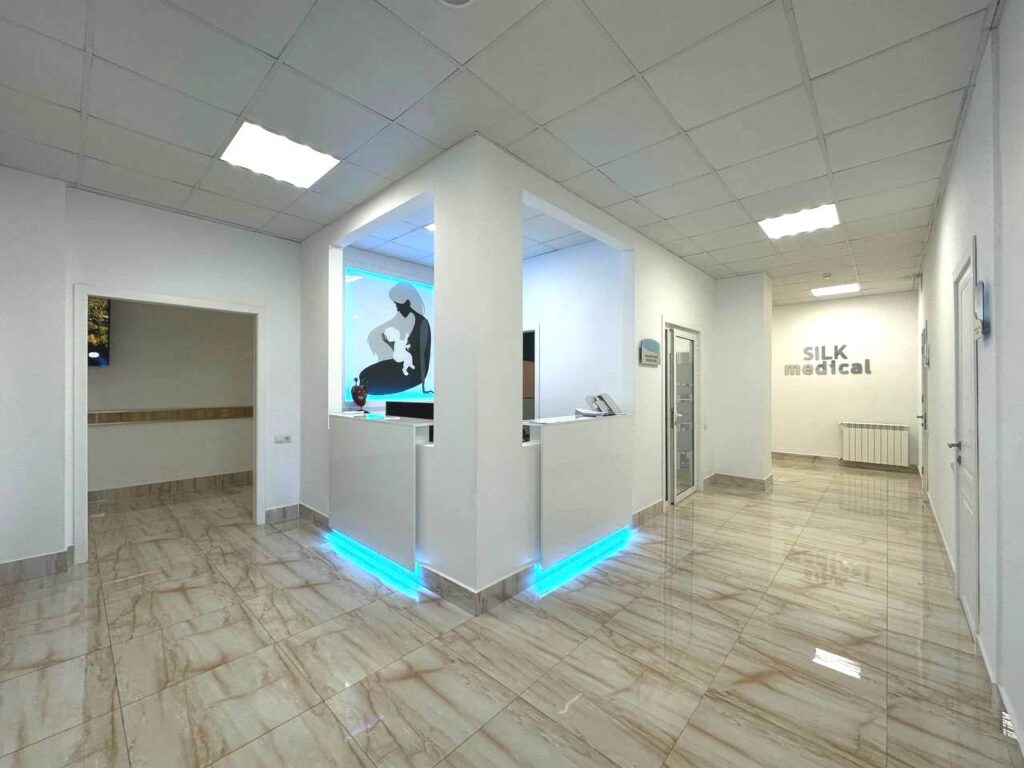When planning for a family, one of the most important steps is to ensure the health and well-being of both parents and their future children. While many factors contribute to a successful pregnancy, it is also valuable to understand the role of chromosomes. Chromosomal irregularities, even if they do not manifest in a daily life, can potentially lead to developmental abnormalities in the offspring. This is where karyotyping comes into play.

What is Karyotyping?
Karyotyping is a cytogenetic method used to study human chromosomes. This analysis provides a detailed examination of the number and structure of a person’s chromosomes, allowing for the detection of any irregularities or abnormalities. Karyotyping is considered the most rapid and informative approach to diagnosing chromosomal pathologies.
At SILK Medical, karyotyping is performed using a single venous blood sample. The process is efficient, and the results produce information about an individual’s chromosomal health.
Who Should Consider Karyotyping?
While karyotyping is strongly recommended for couples experiencing difficulties with conception, SILK Medical advises that anyone planning to start a family undergoes the test. By proactively identifying any chromosomal changes, prospective parents can make informed decisions about their reproductive health and take steps to minimize the risk of passing on chromosomal abnormalities to their children.
Benefits of Karyotyping at SILK Medical
By choosing to undergo karyotyping at SILK Medical, couples can get an understanding of their chromosomal health. The clinic’s geneticists and state-of-the-art facilities offer accurate and reliable results, providing patients with the information they need to make informed decisions about their family planning.
Armed with the knowledge received through karyotyping, prospective parents can work closely with SILK Medical’s team to develop a personalized plan for their reproductive care. This may involve preconception counseling, genetic counseling, or exploring various fertility treatment options.

Indications for Karyotyping
- Advanced Parental Age
Hereditary Disease
When one of the prospective parents is 35 years or older, the risk of chromosomal abnormalities in the offspring increases.
If either partner has been diagnosed with a hereditary condition, karyotyping can help assess the potential impact on future children.
- History of Chromosomal Pathology
Consanguineous Marriage
Couples who already have children with chromosomal abnormalities should consider karyotyping to understand the risk of recurrence in subsequent pregnancies.
When the prospective parents are blood relatives, there is a higher likelihood of inheriting genetic disorders.
- Uterine Abnormalities or Hormonal Imbalances
Spermatogenesis Disorders
Women with structural uterine issues (such as septum or bifid uterus) or hormonal imbalances may benefit from karyotyping to identify any associated chromosomal factors.
Men experiencing problems with sperm production should consider karyotyping to rule out chromosomal causes.
- Unexplained Infertility
Recurrent Pregnancy Loss
When couples have been unable to conceive despite extensive testing and evaluation, karyotyping may give additional useful information.
Couples who have experienced two or more miscarriages, frozen pregnancies, or premature births should consider karyotyping to identify potential contributing chromosomal factors.
- Multiple Failed IVF Attempts
Exposure to Harmful Environmental Factors
When couples have undergone several unsuccessful IVF cycles, karyotyping can help determine if chromosomal abnormalities are playing a role.
People recently exposed to toxic substances, radiation, or other harmful environmental factors should consider karyotyping to check for potential impact on their chromosomes.
Assessing Risks for Unborn Child
Karyotyping can be used to evaluate the likelihood of genetic abnormalities in a developing fetus, providing data for prenatal decision-making.
Please note that karyotype analysis should not be performed when a person is experiencing an acute illness or an exacerbation of a chronic condition, as these factors can interfere with the accuracy of the results. Additionally, the use of antibiotics can render the analysis uninformative. To make sure the clinic provides the most reliable results, patients should abstain from alcohol consumption and smoking for at least two weeks prior to the test.
At SILK Medical, the decision to undergo karyotyping is made in close consultation with the clinic’s geneticists. They provide personalized guidance based on each unique case, leading to the most appropriate testing and support throughout the process.
Couples who meet any of the above indications or have concerns about their chromosomal health, scheduling a consultation with SILK Medical is the first step towards making informed decisions about their reproductive treatment.
Interpreting The Results
A normal human karyotype consists of 46 chromosomes arranged in 23 pairs. Of these pairs, 22 are autosomal (numbered 1 through 22), while the 23rd pair comprises the sex chromosomes. A normal female karyotype is denoted as 46,XX, and a normal male karyotype is represented as 46,XY.
Karyotyping analysis can reveal various quantitative and structural changes in chromosomes, including:
Trisomy
The presence of an extra third chromosome in a pair, resulting in three copies instead of the usual two.
Monosomy
The absence of one chromosome in a pair, leaving only a single copy.
Duplication
The doubling of a specific segment of a chromosome.
Deletion
The loss of a portion of a chromosome.
Translocation
The relocation of a chromosomal segment from one chromosome to another.
Inversion
The rotation of a chromosomal segment by 180 degrees within the same chromosome.
While some chromosomal changes may not have an immediately apparent impact on an individual’s health, the accumulation and inheritance of these alterations can increase the risk of difficulties with conception or the birth of a child with developmental abnormalities.
In cases where karyotyping reveals chromosomal abnormalities, SILK Medical strongly recommends a consultation with the clinic’s geneticists. They will give an assessment of the specific risks associated with the identified chromosomal changes and offer guidance on potential solutions.
During the consultation, the geneticist will explain the implications of the karyotyping results, addressing any concerns or questions the couple may have.
The discussion will include the likelihood of the chromosomal abnormalities impacting future pregnancies, as well as information on available options, such as preimplantation genetic testing (PGT) or donor gametes, depending on the specific circumstances.
Take Control of Your Reproductive Health
Don’t leave the health of your future family to chance. By undergoing karyotyping at SILK Medical, you can proactively address any potential chromosomal concerns and start planning parenthood with greater confidence and comfort.
To learn more about karyotyping or to schedule an appointment, please contact SILK Medical today. The clinic’s staff is ready to answer your questions and guide you through the process of understanding your chromosomal health. Take the first step towards building a strong foundation for your family’s future by booking a consultation with SILK Medical’s geneticists.

